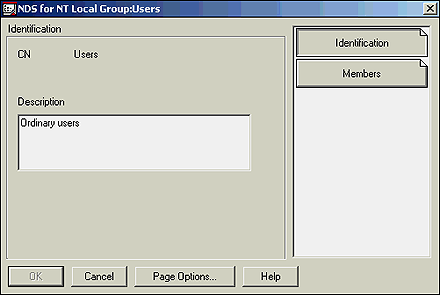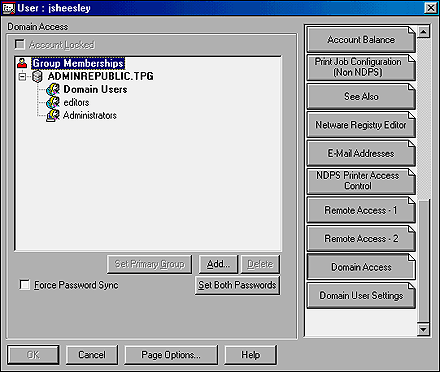

Financial Ltd
|

Directory Enquiries

Currency Converter

Train Tickets



|
| |
If you right-click the NDS for NT Local Group object (or
the NDS for NT Global Group object) and select Details, you'll bring up the
properties notebook for that object type. The properties notebooks for both
object types are very similar and have only two tabs—Identification and
Members. Figure G shows the properties notebook for the NT Local Group
object.

Figure G
The NDS for NT Local Group object and NDS for NT Global Group
object have similar properties.
The Identification tab displays a description of the object. You can include
additional information in the Description field. If you click the Members tab,
you can see which users belong to the group. You can add users by clicking Add
and selecting the user or users from the list of available objects. To delete a
user, highlight it and click Delete.
The NDS for NT object that a Domain object can contain is the NDS for NT
Workstation object. The NDS for NT Workstation object represents workstations
and servers that reside in the NT server's domain. Don't confuse this object
with the regular NDS Workstation object. If you right-click the NDS for NT
Workstation object and select Details, you'll see that this object is for
information purposes only. You can enter a name and description, but that's it.
NDS for NT properties added to User objects
NDS for NT not only creates new objects in your NDS tree, it also extends
existing User objects and adds new properties to them. Select a user in your NDS
tree, right-click it, and select Details. When the User Properties notebook
appears, scroll down to the bottom of the screen. You'll notice two new tabs in
the notebook: Domain Access and Domain User Settings.
As the tab name suggests, the Domain Access properties window helps you manage
the User's Domain group memberships, as shown in Figure H. The Group
Memberships pane shows the domains and groups to which the user belongs. You can
add the user to a domain or group by clicking the Add button. Then, choose the
object you want the user to join. To delete a user from a group or domain, just
highlight the group and click Delete.

Figure H
 

|

